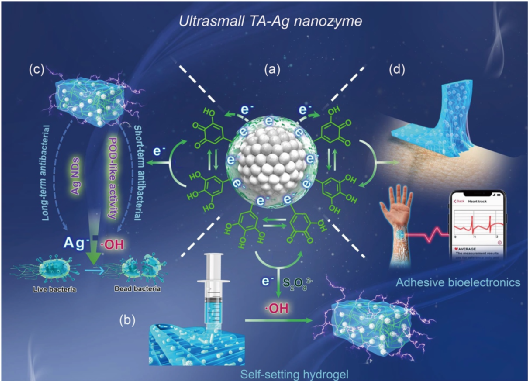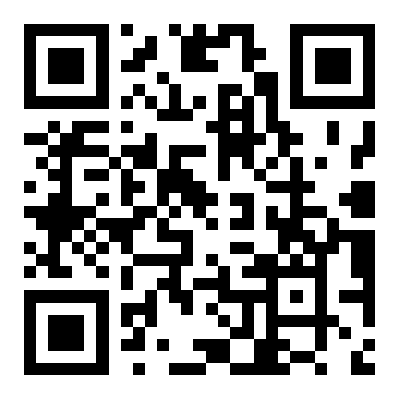Southwest Jiaotong University Lu Xiong/Xie Chaoming's team: Mussel-like nanoenzymes used to construct antibacterial conductive adhesive hydrogel
Nanoenzyme is an artificial mimic enzyme that has both the characteristics of nanomaterials and the catalytic performance of natural enzymes. Compared with natural enzymes, nanoenzymes have the advantages of high stability, strong catalytic activity, and low cost, so they are widely used in the fields of disease diagnosis, treatment and biosensing. The oxidoreductase activity of nanoenzymes includes peroxidase, catalase, superoxide dismutase and so on. At present, most of the design of nanoenzymes focuses on improving their catalytic activity. However, it is a challenging task to develop multifunctional nanoenzymes and construct biological materials to meet the needs of different environments.
Hydrogel, which has the characteristics of human tissue mechanics and physiology, has been widely used in the field of bioelectronics in recent years. However, the interface combination between hydrogel bioelectronics and human tissue is one of the key issues that directly affect its performance. At present, most bio-electronic devices require external auxiliary fixation, which is likely to cause unstable contact with human tissues and lead to signal distortion problems. Therefore, improving the adhesion of the hydrogel to human tissues and constructing a stable interface between the hydrogel bioelectronics and human tissues is conducive to improving the performance of bioelectronics.
In response to these problems, recently, the team of Professor Lu Xiong and Associate Professor Xie Chaoming of Southwest Jiaotong University designed and developed a new type of mussel-like nano-enzyme. The mussel-like nanoenzyme not only has the catalytic activity of a natural enzyme, but also has mussel-like adhesion properties. Using mussel-like nanoenzymes, they constructed a multifunctional hydrogel with antibacterial, conductive, flexible and adhesive properties, and used it in bioelectronics. The imitation mussel nanozyme is composed of natural polyphenol tannin (TA) chelated silver nanoparticles (Ag NPs). It has the following advantages: (1) Utilizing its highly efficient and stable peroxidase activity, the mussel-like nanoenzyme can catalyze the self-forming of the hydrogel without external stimuli, such as UV light and thermal initiation; (2) Imitating mussel Beinamizyme catalyzes the production of ROS by H2O2 through its peroxidase activity, and combines the antibacterial properties of Ag itself to provide the hydrogel with catalytic antibacterial properties. (3) Based on the electron transfer between TA and Ag NPs, the imitation mussel nanozyme provides a large number of polyphenol groups to the hydrogel, which strengthens its tissue adhesion, mechanical properties and conductivity, so that the hydrogel can be used in Stable detection of human physiological signals without external auxiliary fixation.

Figure 1. Catalytic mechanism of mimic mussel nanozyme (TA-Ag). (A) The imitation mussel nanoenzyme maintains the phenol-quinone redox balance through electron transfer on its surface. (B) Mussel-like nano-enzyme catalyzes the self-forming of hydrogel. (C) Mussel-like nano-enzymes endow the hydrogel with catalytic and antibacterial properties. (D) The mussel-like nanoenzyme gives the hydrogel good mechanical properties, adhesion and conductivity, which can be used to detect physiological signals when it adheres to human skin.
The work was published in "Bioactive Materials" under the title of Mussel-inspired nanozyme catalyzed conductive and self-setting hydrogel for adhesive and antibacterial bioelectronics. The co-first authors of the paper are PhD candidate Jia Zhanrong and master candidate Lv Xuanhan of School of Materials Science and Engineering, Southwest Jiaotong University. Professor Lu Xiong and Associate Professor Xie Chaoming are the co-corresponding authors.
Paper link:
https://www.sciencedirect.com/science/article/pii/S2452199X21000451
Hydrogel, which has the characteristics of human tissue mechanics and physiology, has been widely used in the field of bioelectronics in recent years. However, the interface combination between hydrogel bioelectronics and human tissue is one of the key issues that directly affect its performance. At present, most bio-electronic devices require external auxiliary fixation, which is likely to cause unstable contact with human tissues and lead to signal distortion problems. Therefore, improving the adhesion of the hydrogel to human tissues and constructing a stable interface between the hydrogel bioelectronics and human tissues is conducive to improving the performance of bioelectronics.
In response to these problems, recently, the team of Professor Lu Xiong and Associate Professor Xie Chaoming of Southwest Jiaotong University designed and developed a new type of mussel-like nano-enzyme. The mussel-like nanoenzyme not only has the catalytic activity of a natural enzyme, but also has mussel-like adhesion properties. Using mussel-like nanoenzymes, they constructed a multifunctional hydrogel with antibacterial, conductive, flexible and adhesive properties, and used it in bioelectronics. The imitation mussel nanozyme is composed of natural polyphenol tannin (TA) chelated silver nanoparticles (Ag NPs). It has the following advantages: (1) Utilizing its highly efficient and stable peroxidase activity, the mussel-like nanoenzyme can catalyze the self-forming of the hydrogel without external stimuli, such as UV light and thermal initiation; (2) Imitating mussel Beinamizyme catalyzes the production of ROS by H2O2 through its peroxidase activity, and combines the antibacterial properties of Ag itself to provide the hydrogel with catalytic antibacterial properties. (3) Based on the electron transfer between TA and Ag NPs, the imitation mussel nanozyme provides a large number of polyphenol groups to the hydrogel, which strengthens its tissue adhesion, mechanical properties and conductivity, so that the hydrogel can be used in Stable detection of human physiological signals without external auxiliary fixation.

Figure 1. Catalytic mechanism of mimic mussel nanozyme (TA-Ag). (A) The imitation mussel nanoenzyme maintains the phenol-quinone redox balance through electron transfer on its surface. (B) Mussel-like nano-enzyme catalyzes the self-forming of hydrogel. (C) Mussel-like nano-enzymes endow the hydrogel with catalytic and antibacterial properties. (D) The mussel-like nanoenzyme gives the hydrogel good mechanical properties, adhesion and conductivity, which can be used to detect physiological signals when it adheres to human skin.
The work was published in "Bioactive Materials" under the title of Mussel-inspired nanozyme catalyzed conductive and self-setting hydrogel for adhesive and antibacterial bioelectronics. The co-first authors of the paper are PhD candidate Jia Zhanrong and master candidate Lv Xuanhan of School of Materials Science and Engineering, Southwest Jiaotong University. Professor Lu Xiong and Associate Professor Xie Chaoming are the co-corresponding authors.
Paper link:
https://www.sciencedirect.com/science/article/pii/S2452199X21000451
+86-18915413828(WhatsApp&WeChat)


